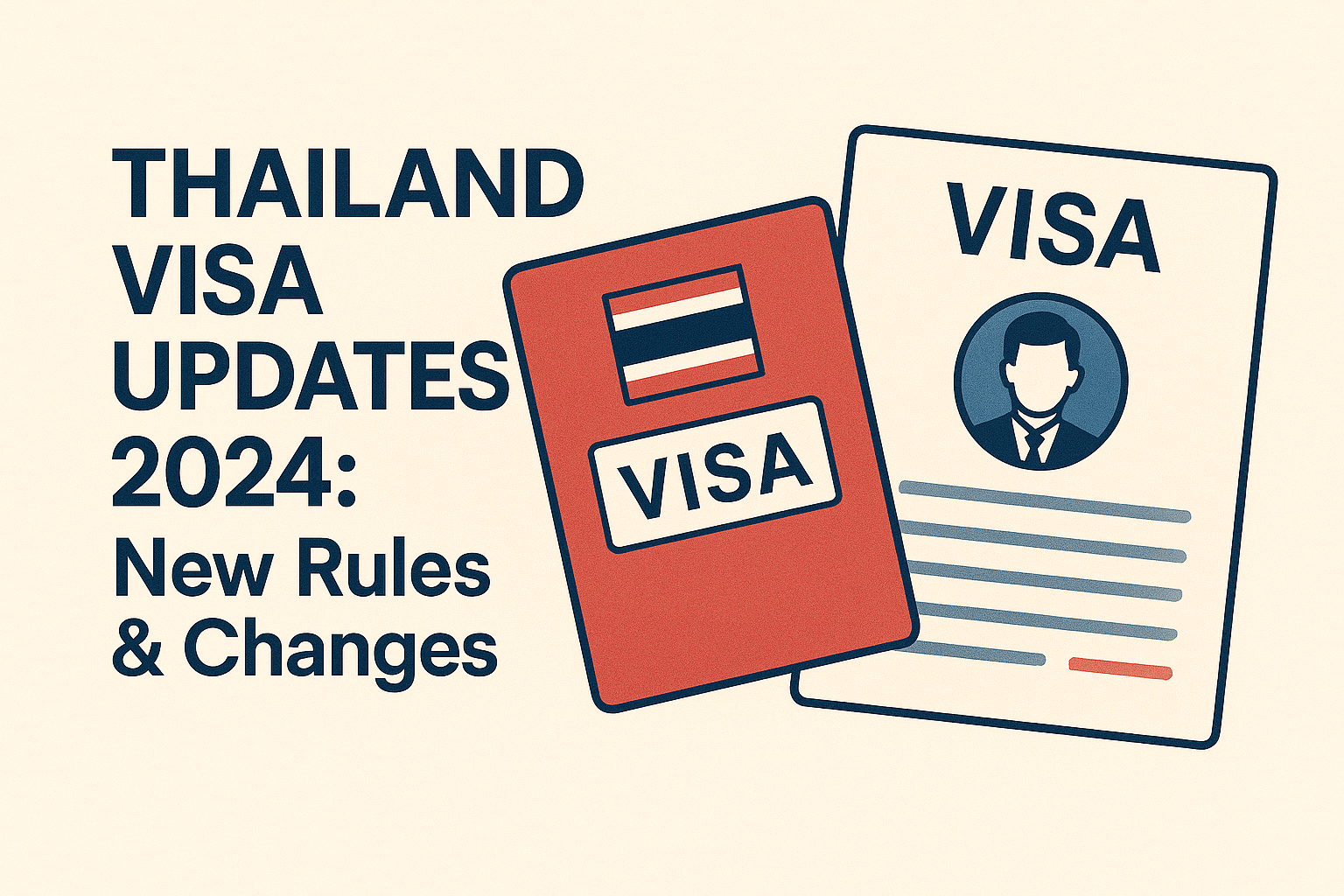Are you dreaming of white sandy beaches, vibrant street markets, and ancient temples? 🏖️🛍️🏯 Thailand, the Land of Smiles, has always been a top destination for tourists, expats, and digital nomads alike. But hold on to your passports, because 2024 is bringing a wave of changes to Thailand’s visa system that you need to know about!
From exciting new opportunities for long-term residents to game-changing reforms for digital nomads, Thailand is reshaping its immigration landscape. Whether you’re planning a tropical getaway, considering retirement in paradise, or looking to expand your business horizons, these updates could dramatically impact your Thai adventure. But don’t worry – we’ve got you covered with all the essential information you need to navigate these changes like a pro.
In this comprehensive guide, we’ll walk you through the 10 key areas of Thailand’s visa updates for 2024. From the brand-new Long-Term Resident Visa to modifications in tourist, work, and retirement visas, we’ll explore how these changes might affect your plans. So, grab your favorite Thai iced tea ☕, sit back, and let’s dive into the exciting world of Thailand’s new visa landscape!
Overview of Thailand’s Visa System in 2024

Key changes from previous years
- Introduction of Long-Term Resident Visa
- Digital Nomad Visa launch
- Work Permit reforms
- Tourist Visa updates
- Retirement Visa modifications
| Visa Type | Old System | New System |
|---|---|---|
| Tourist | 30-60 days | Extended options |
| Work | Complex process | Streamlined |
| Digital Nomad | Not available | Introduced |
Impact on different types of travelers
Thailand’s 2024 visa system overhaul caters to diverse traveler needs. Tourists benefit from extended stay options, while digital nomads gain official recognition. Retirees face modified requirements, and investors enjoy new opportunities. These changes aim to boost tourism, attract skilled professionals, and stimulate economic growth.
New Long-Term Resident Visa
Eligibility criteria
- Annual income of $80,000+
- Investment of $1 million in Thai property/businesses
- Highly skilled professionals in targeted industries
- Retirees aged 50+ with $1.5 million in assets
Benefits for visa holders
| Benefit | Description |
|---|---|
| Work permit | Automatic work authorization |
| Tax perks | Reduced personal income tax rate |
| Property rights | Ability to own land and property |
| Family inclusion | Visa covers spouse and dependents |
The new Long-Term Resident (LTR) visa offers significant advantages for qualified individuals. Eligibility focuses on high-net-worth individuals, skilled professionals, and retirees. Benefits include streamlined work authorization, tax incentives, and expanded property rights. Now, let’s explore the application process for this exciting new visa option.
Updates to Tourist Visas
Changes in visa-on-arrival policies
Thailand has expanded its visa-on-arrival program, now offering this option to citizens of 30 countries. The stay duration has been extended from 15 to 30 days, providing more flexibility for short-term visitors. However, stricter documentation requirements are now in place.
Extended stay options
| Visa Type | Previous Duration | New Duration |
|---|---|---|
| Single-entry tourist visa | 60 days | 90 days |
| Multiple-entry tourist visa | 6 months | 9 months |
These extended options cater to travelers seeking longer stays in Thailand, aligning with the country’s goal to boost tourism and accommodate diverse travel needs.
Work Permit Reforms
Streamlined application process
The Thai government has significantly simplified the work permit application process for 2024. Key improvements include:
- Online submissions
- Reduced documentation requirements
- Faster processing times
| Old Process | New Process |
|---|---|
| Paper-based | Fully digital |
| 2-4 weeks | 5-7 days |
| Multiple visits | Single visit |
Expanded categories for skilled workers
Thailand has broadened its skilled worker categories, attracting diverse talent. New additions include:
- AI specialists
- Renewable energy experts
- Cybersecurity professionals
This expansion aligns with Thailand’s economic goals and digital transformation initiatives.
Digital Nomad Visa Introduction
Target demographic
- Digital professionals
- Remote workers
- Freelancers
- Online entrepreneurs
Permitted activities and restrictions
| Permitted | Restricted |
|---|---|
| Remote work | Local employment |
| Online business | Offline business |
| Digital services | Manual labor |
The Digital Nomad Visa caters to location-independent professionals seeking extended stays in Thailand. This visa allows digital workers to legally operate their online businesses or remote jobs while enjoying Thailand’s lifestyle. However, it’s crucial to understand the limitations, as engaging in local employment or physical businesses is prohibited.
Retirement Visa Modifications
Revised financial requirements
The Thai government has adjusted the financial criteria for retirement visas in 2024:
| Requirement | Previous | New |
|---|---|---|
| Monthly income | 65,000 THB | 80,000 THB |
| Savings in Thai bank | 800,000 THB | 1,000,000 THB |
| Combined income/savings | N/A | 1,500,000 THB |
Health insurance mandates
Retirees must now provide proof of comprehensive health insurance coverage:
- Minimum 400,000 THB outpatient coverage
- Minimum 40,000 THB inpatient coverage
- COVID-19 coverage explicitly required
Education Visa Enhancements
Extended study periods
Thailand’s education visa now offers longer study periods, allowing students to pursue their academic goals without frequent visa renewals. The new system provides:
- 1-year visas for language courses
- 2-year visas for undergraduate programs
- 3-year visas for postgraduate studies
| Program Type | Visa Duration |
|---|---|
| Language | 1 year |
| Undergraduate | 2 years |
| Postgraduate | 3 years |
Part-time work allowances
Students can now engage in part-time work, enhancing their educational experience and financial stability. This change allows up to 20 hours of work per week during term time and full-time employment during holidays, aligning Thailand’s policies with other popular study destinations.
Investment-Based Visas
A. New threshold amounts
The Thai government has revised investment thresholds for visa eligibility:
| Investment Type | Old Threshold | New Threshold |
|---|---|---|
| Real Estate | 10 million THB | 15 million THB |
| Business | 2 million THB | 5 million THB |
| Stocks/Bonds | 7 million THB | 10 million THB |
B. Qualifying investment types
Thailand now recognizes a broader range of investments for visa purposes:
- Real estate purchases
- Thai company shares
- Government bonds
- Startup investments
- Venture capital funds
These changes aim to attract diverse foreign investments and boost economic growth.
Compliance and Enforcement
Stricter overstay penalties
Thailand has implemented more stringent penalties for visa overstays in 2024. Fines have increased, and long-term bans are now more common for repeat offenders. Here’s a breakdown of the new penalties:
| Overstay Duration | Fine (THB) | Ban Period |
|---|---|---|
| 1-90 days | 500/day | None |
| 91-365 days | 20,000 | 1 year |
| > 365 days | 50,000 | 3 years |
Enhanced tracking systems
To improve visa compliance, Thailand has introduced advanced biometric systems at all entry points. These systems are linked to a centralized database, allowing real-time tracking of visa statuses and overstays.
How to Prepare for the New Rules
Documentation checklist
- Passport (valid for at least 6 months)
- Visa application form
- Recent passport-sized photos
- Proof of accommodation
- Financial statements
- Travel itinerary
- Health insurance
Online resources and official channels
| Resource | Purpose |
|---|---|
| Thai Embassy website | Official visa information |
| Immigration Bureau portal | Application submission |
| Ministry of Foreign Affairs | Policy updates |
Stay informed about Thailand’s new visa rules by regularly checking these official channels. Prepare your documentation well in advance, ensuring all required items are up-to-date and meet the new criteria. This proactive approach will help streamline your visa application process and avoid potential delays or complications.
Thailand’s visa landscape in 2024 brings exciting changes for visitors, expats, and investors alike. The introduction of the Long-Term Resident Visa and Digital Nomad Visa opens up new opportunities for extended stays and remote work. Meanwhile, updates to tourist, work, retirement, and education visas aim to streamline processes and attract diverse groups to the Kingdom. Investment-based visas continue to encourage foreign capital, supporting Thailand’s economic growth.
As these changes take effect, it’s crucial to stay informed and prepared. Whether you’re planning a vacation, considering a move, or looking to invest in Thailand, familiarize yourself with the new rules and requirements. Consult official sources, seek professional advice if needed, and ensure all your documentation is in order. By embracing these visa updates, Thailand continues to position itself as a welcoming destination for global citizens, offering a blend of opportunity, culture, and tropical beauty.

